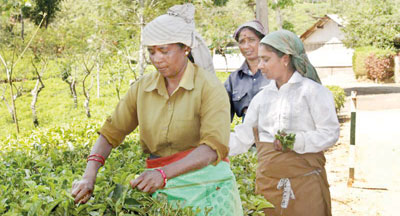News
Labour Ministry urges RPCs, TUs to meet

Each kilo plucked by a worker, will be paid at a specific rate as is done in the tea small holdings sector. Pic by G. Krishanthan
The Labour Ministry has called for a one-on-one meeting next week with owners of plantation companies and representatives of trade unions to finalise the long deadlocked collective agreement while considering a new productivity based system proposed by the Planters Association.
Labour and Trade Unions Relations Minister W. D. J. Senewiratne told the Sunday Times that he hoped a positive compromise could be reached between the two parties as the existing agreement has lasted for more than one and half years.
“The employers and employees have to understand each others opinions and difficulties they are going through. There is a positive increase in tea prices from this month while an alarming decline has been noted of rubber prices in the world market. We have to consider all of these things when we negotiate a agreement like this,” he said.
As some of the trade union representatives met him this week to convey their concerns over the new proposal of ‘a productivity based wage system’, Minister Senewiratne said a final decision would be taken after a careful study of the proposals made by the trade unions.
The Regional Plantation Companies (RPCs) have proposed an interim model to introduce the concept of a productivity based self managed wage model to the plantation sector.
According to the concept paper which was put forward for discussion among the trade unions , the proposed productivity model will guarantee at least ten days work per month on the current wage system, while for the rest of the days, the workers will be paid on a productivity based payment system where each kilo plucked by a worker, will be paid at a specific rate as is done in the tea small holdings sector.
Under this new system, each worker will be assigned sufficient tea bushes for three days of work for a week with a mix of all categories of tea fields in different locations. An agreement is to be signed between the growers and the estate management for one year and it will be automatically renewed, if the conditions set out are satisfactorily met in the assigned block.
It also indicates under the heading ‘terms and conditions’ that the management will ensure the supervision and the execution of all the standard harvesting and field management practices relating to the plantation, while maintaining records of inputs suppliers and purchase of green leaf. “The responsibility of the stakeholders will be to assist, create awareness, train, monitor, study, evaluate, and provide solutions for proper agricultural management of the blocks.
The Ceylon Workers Congress (CWC), the major trade union in the upcountry has sent its proposals this week to the Labour Ministry seeking some amendments to the proposed productivity based system. Sticking to its demand of increasing the minimum wage to Rs. 1000per day,the union said it is its firm belief that negotiations with the plantation companies and arriving at an agreement will create a win-win situation for both parties.
Ceylon Workers Congress (CWC) President Muthu Sivalingam said there has to be some key changes made in the new productivity based system in order to make it a viable solution for the workers. “ We are also very circumspect about this ‘outsourcing’ scheme after observing the results in some estates where it is already implemented,”
The Joint Plantations Trade Union, one of the three stakeholders in the collective agreement feared the new proposal would put the plantation workers livelihood at risk without any guarantees of a long time sustainable plan.
Joint Plantations Trade Union Secretary General P.P. Ramanathan told the Sunday Times that the new proposals put forward by the plantation company owners violated the common agreement signed in 2001 which secured 25 working days per month (300 per year) while the new system provides only twelve days a month (144 days per year).
” Another violation of law with regard to plantations related to the recently passed minimum wage bill that ensured Rs. 10,000 per month for employees in the private sector. According to the new proposals, the plantation workers would be paid only Rs. 6,800 as a monthly salary,” he said.
The plantation trade unions in the upcountry are of the view that as the new proposals indicated a productivity based income, tea leaf output in an estate differs according to its geographic location.
“In estates in Nuwara Eliya , tea production is high when compared to estates in other areas. The plantation workers’ income would not be stable and might fluctuate depending on such reasons,” Mr. Ramanathan said.
The trade unions have been insisting the collective agreement be re-negotiated with necessary amendments as it has lasted for over eighteen months. The unions had informed the owners of the plantation companies that they could discuss matters relating to productivity only after the signing of the collective agreement.
Director General and Employers’ Federation CEO Kanishka Weerasinghe told the Sunday Times that the proposal is under consideration by trade unions as the talks will begin to sign the collective agreement.
However, Mr. Weerasinghe declined to elaborate about the new system since it is under study by relevant parties, noting only if agreement is arrived at it will be a win-win deal for both parties and provide stability to the industry.”

